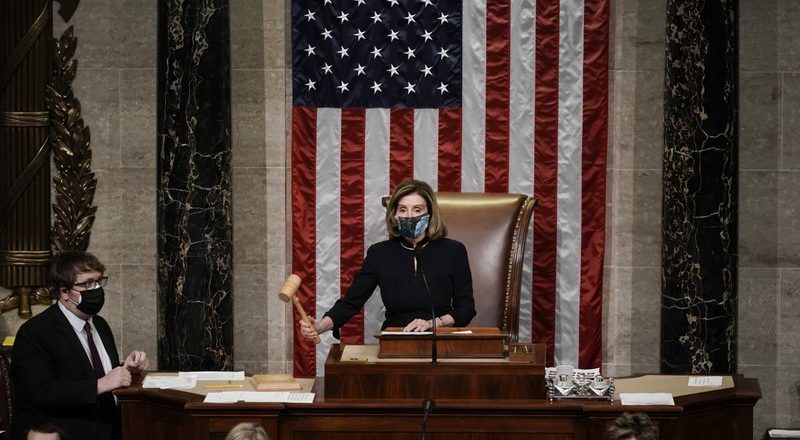The second impeachment of Former President Donald Trump is set to begin on February 9th in the Senate. This marks the first time a United States president has been impeached twice, but despite the severity of this instance, it is not likely that the Senate will have the two-thirds supermajority to convict.
This impeachment is also unique because Trump no longer holds office, which calls the Senate’s jurisdiction into question. However, the majority opinion of prominent constitutional scholars is that Congress can impeach civil officials even after they leave office. In this case, the severity of Trump’s impeachment is much greater than any prior accusations against any official. In response to the events of January 6th, the language in the article of impeachment accuses Trump of engaging in “high Crimes and Misdemeanors by inciting violence against the Government of the United States.”
There have only been four official impeachments in our nation’s history: Andrew Johnson in 1868, Bill Clinton in 1998, and Donald Trump’s impeachments in 2020 and 2021.
Both of Trump’s impeachments were predicated by his actions surrounding the 2020 elections. The first impeachment was over allegations of a quid-pro-quo deal where Trump illegally pressured Ukraine to investigate Hunter Biden, President Joe Biden’s son, in order to skew public perception against the Biden family with conspiracy theories of corruption. The newest allegations about Trump’s role in inciting the mob at the Capitol are also tied to his rhetoric surrounding the election, specifically the months where he spread baseless theories about the illegitimacy of the results and attempted to overturn results in Georgia.
The Senate did not vote to convict Former President Trump on his first impeachment, with only one Senator – Mitt Romney (R-UT) – breaking party lines to vote for conviction of abuse of power. After the first impeachment, Senator Susan Collins (R-ME), in an explanation as to why she planned to vote to acquit Trump, said that she believed “that the president has learned from this case. The president has been impeached. That’s a pretty big lesson.” Evidently, Collins’ conviction that Trump would not attempt to retain hold on power by nearly any means necessary did not hold true, as less than a year later the country is in the midst of another impeachment trial.
So far, no Republican Senators have publicly said they will vote to convict for the second trial, and at least 17 are needed to break party lines in order to achieve the two-thirds supermajority. On a recent 55-45 vote in the Senate on the constitutionality of the Senate trial, only 5 Republican senators voted that the proceedings are constitutional. Based on statements given by Republican Senators, only 15 are either undecided or have not made a statement, implying that there will not be enough votes for a conviction.
It is imperative that Senators vote to preserve our functions of government. If Trump is acquitted in the Senate, it will set a dangerous precedent about what presidents are able to get away with while in office. Inciting a riot in the nation’s Capitol while Congress is in session is an attack on our nation’s systems and should be punished at the highest levels. Although congressional impeachment proceedings are not criminal trials, they have political repercussions. The power given to the Senate in impeachment proceedings both allows them to remove a person from office, but it also allows them to disqualify that person from running for office ever again. Donald Trump is no longer the president, so he can no longer be removed from office, but he can still be disqualified from holding future office. He has only served one term in office, so he can still run for President in 2024 or later. Given Trump’s repeated attempts to dismantle our democracy and maintain power, this should be a step seriously considered by the Senate in order to ensure that something like Jan. 6th never happens again.
Liz Cheney, a House Representative from Wyoming, and one of the most prominent GOP leaders, issued a damning statement against President Trump, saying that “there has never been a greater betrayal by a President of the United States of his office and his oath to the Constitution.” She went further in her indictment of him, saying he “summoned this mob, assembled the mob, and lit the flame of the attack” on Jan. 6th. Cheney is joined by Senators Mitt Romney (R-UT), Ben Sasse (R-NE), and Pat Toomey (R-PA) in supporting impeachment proceedings, although none have said how they will vote.
Ultimately, it is unlikely the Senate will vote to convict Trump on these counts. If Trump is acquitted, it would be a betrayal of the American people and would set a dangerous precedent for any future leader who might attempt something more egregious. A government for the people and by the people no longer functions if someone who attempts to take power away from the people gets away with his actions scot-free.
https://crsreports.congress.gov/product/pdf/LSB/LSB10565
https://www.politico.com/news/2021/01/13/liz-cheney-removal-impeachment-vote-458889
https://www.congress.gov/bill/117th-congress/house-resolution/24/text
https://www.vox.com/policy-and-politics/2019/10/1/20891510/hunter-biden-burisma-ukraine-shokin

